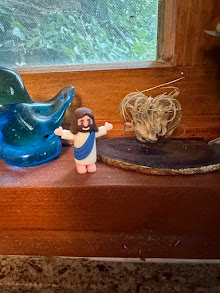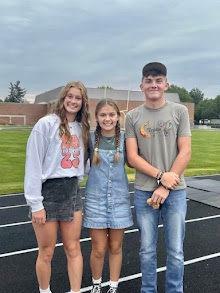The old upright is missing more than a few pieces of ivory, half a black key, and quite a bit of veneer. One of the three pedals is detached. But it has been tuned in the past year and despite the cosmetic defects, its music is sound; its sound is music.
Especially when little fingers pick out a melody, playing by ear, looking at the key names printed on the Scotch magic tape on the keys. 'Twinkle, Twinkle, Little Star', 'Are You Sleeping', and 'Away in the Manger' are the tunes Abbie and Lizzie play.
My first song was played on a black baby grand while my mother packed lunches in the kitchen and long before the bus arrived to pick me up for school. It went like this: "Stepping up, stepping down, then a skip." And it was the first tune in John Thompson's Modern Course for the Piano, beginning with the red book, Teaching Little Fingers to Play."
Every once in a while, my parents played piano duets, but the only tune I remember is the rollicking four hands in unison of March Militaire. If our house had been built on anything but a concrete pad, the walls would have rung. I'm certain the windows shook.
Every once in a while, my parents played piano duets, but the only tune I remember is the rollicking four hands in unison of March Militaire. If our house had been built on anything but a concrete pad, the walls would have rung. I'm certain the windows shook.
I learned to play the songs I loved. Even today, when I remember the hymns, chapter and verse, of my childhood, I find they were the ones in the little hymnbook, copyright 1942 and beautifully illustrated, that had always been in the piano bench.

And we played the old favorites when we got together. The tiny notes of chamber music scores, the two of us sharing one stand and struggling to read the accidentals in violin music by the great masters. And Mozart, the same duets we'd played three and a half decades previously, less fluid, more ragged, perhaps.
"Illustrated by Miss Elliott": how quaint an attribution in Gothic script. To sing "I Love to Tell the Story" gives me-the-grandma a catch in my throat. How me-the-child must have loved the melody to fight through the four flats of the arrangement in Favorite Hymns!
"Down in the Valley" and "St. Louis Blues"are songs I still see in my mind's eye. With delusions of grandeur, I plunked my way through the slow parts of "Moonlight Sonata", "Cavelleria Rusticana", and Jules Massenet's "Elegie" at Granny's house. Bless her, she was blissfully tolerant, as befitting her title, of my musical travesties and allowed the cacophony of her 33 LPs and my preteen piano pretensions, especially my fixation with Offenbach's 'Barcarolle' in a way my father's sensibilities would never have tolerated. After all, he fired me from whistling within earshot, an incident I remember every time Aaron or Lizzie tell Joshie to "StopWhistling!"
On the other hand, my father was endlessly patient with his daughter when it concerned the clarinet. I squawked my first squeak in 4th grade, holding the mouthpiece and reed and blowing hard enough to produce not just a noise, but the most piercing harmonic possible. Lord only knows why this seemed a good idea, but perhaps the instrument salesman was exercising damage control, assuming some percentage of the woodwind bodies would crash before purchase as the first birthing pains of music were made.
At any rate, the early morning piano lessons were soon swapped for pre-school clarinet practice. A half hour, every morning, with one morning a week set aside for examination or playing duets. Playing for or with my father those beginning years was a trial not exceeded many times, and from this distance, I cannot tell you why because he was a patient teacher no matter how often I got lost or mangled the counting. The only unforgiven was lack of effort.
Much of that music survives. The Dixieland Combo Ork with old timey tunes like "The Tiger Rag" and "Swingin' the Blues". The Rubank arrangements of Mozart tunes for two clarinets...because no one ever masters Mozart. My classmates and I thought we were hot stuff in junior high sawing away at the clarinet solo in 'Procession of the Sardar' and taking the sixteenths in the band arrangement of the Overture to the Marriage of Figaro at time and a half. We were thirteen years old, long on technique and short on musicianship.
Time passed....and a year later I was accompanying my father to rehearsals of the Southwest Symphony, counting an eternity of measures as second clarinets in an orchestra are wont to do. He was going to be out of town and I had been tapped to fill in while he was gone and, he hoped, make the entrances necessary to cover the exposed solos that are the role of first clarinets in an orchestra. It was an educational and white knuckled experience. Educational: attempting to effect a transposition on the fly between A and B flat clarinets. And terrifying: realizing the effrontery of imitating the clarion clear tones of the haunting clarinet solo at the end of 'Night on Bald Mountain'. I may not have been humble as an eighth grader, but I was after that fall as a freshman!

My father did not play for years while he was the bread winner and new family man. But he went back to his instruments faithfully in his thirties and for decades thereafter. Despite broken fingers and smashed thumbs, he practiced on his metal B flat clarinet, a vestige of WWII when nickle was the substitute for the exotic woods used in constructing French and German clarinets.He experimented with all kinds of funky fingerings so our duets....him on his antique licorice stick, me on my antique Buffet....would be acceptably in tune. He played whatever reed instrument was in short supply in whatever musical group he joined.
He bought a big organ cheap. He took up the violin.
But, then again, no one ever masters Mozart.
























No comments:
Post a Comment